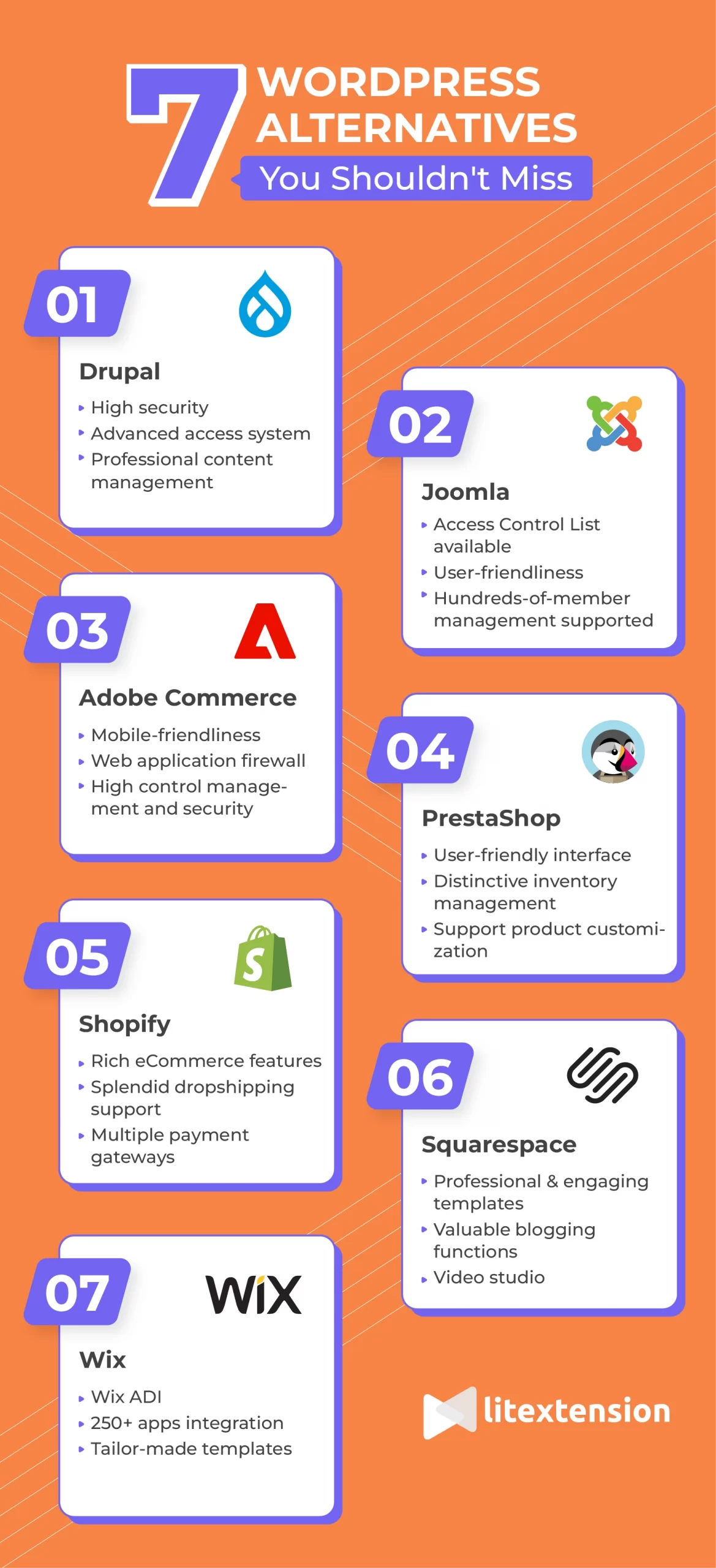Introduction
Mostly, when mentioning creating a website, WordPress usually comes to mind. It is undoubtedly one of the most popular publishing platforms and the best blog site. Yet it’s not everyone’s favourite. Many WordPress users still look for some potential WordPress alternatives to suit their needs better.
LitExtension will be providing you with a collection of 7 best WordPress alternatives in this article with their highlighted features, pricing, and target users. Scroll down to get:
- CMS Alternatives to WordPress
- Website Builder Alternatives
- WordPress Alternatives: FAQs
When it comes to WordPress, two solutions might cause confusion: WordPress.com vs WordPress.org. WordPress.com is a self-hosted platform, while WordPress.org is an open source one. In this article, we will discuss alternatives to WordPress.org.
Two main types of alternative websites to WordPress.org are content management system (CMS) and website builder. They differ in features, strengths, and weaknesses. Moreover, all of them offer plenty of options for customers to replace their current websites with WordPress.
CMS Alternatives to WordPress
When it comes to alternatives to WordPress for blogging, users should consider a list of splendid CMS platforms. CMSs allow multiple users to create, edit, and publish content and store it in a database. With a CMS website, you can take proper control of your site regarding look, content, and functionality.
WordPress is the most well-known CMS, but if it’s not your cup of tea, other CMS WordPress competitors may be. 4 CMS alternatives to WordPress below, which offer many outstanding features, will outshine WordPress and satisfy your needs.
Drupal

Apart from WordPress, Drupal is another famous open source CMS. It’s not a simple site to use as it requires high technical knowledge of HTML, PHP, and CSS. Large organizations such as government agencies, global businesses, and higher education institutions usually prefer Drupal, and here are why:
Highlighted features
- Security system: Drupal is highly secured and trustworthy thanks to user access control, database encryption, and malware attack prevention.
- Multilingual functions: Drupal beats WordPress in multilingual features as it offers multi-languages that come with installation interface. Meanwhile WordPress users need supporting plug-ins to translate website elements’ languages.
- Proper control management: Despite being a CMS similar to WordPress, Drupal provides more advanced access system with proper control. Even though the number of modules and themes offered by Drupal is smaller than WordPress, these add-ons in Drupal are highly configurable. An extensive library of 48,000+ modules available and 3000+ themes of Drupal helps users control the look and functionality of the website.
- Distributions: Among WordPress alternatives, Drupal has become an optimal platform thanks to its unique package. These special packs combine the original and additional software for specific website installations.
- Marketing automation: The digital integration with automation platforms enhances marketing communication tasks across multi-channels.
- Content management: Users can manage a massive amount of content with a specific classification system.
Pricing
Drupal is free; however, you still need to pay for a web host and domain name. Plus, if you don’t have technical skills, you may have to hire an expert to build your website.
Who is it for?
Drupal and WordPress are two equally flexible CMSs in website creation. Nevertheless, consider using Drupal in case the website has a significant amount of content that requires superior security functions. It’s one of the best WordPress alternatives for experienced and skillful users.
Check out our head-to-head comparison of Drupal vs WordPress now to choose the more suitable one for your store success.
Joomla

Being a noticeable open source CMS, Joomla is often in comparison with WordPress and is called one of Drupal competitors. This site seems to be a combination of the flexibility of Drupal and the user-friendliness of WordPress. It is an all-round website utilized by plenty of users and developers, including businesses of sizes, non-profit organizations, etc.
Highlighted features
- Multilingual features: 70+ language translation functions and extensions are available for multilingual content management.
- Access Control List (ACL): Joomla is proud to call ACL one of its most powerful features. ACL lets the administrator control users’ actions and permission on the site in editing, viewing, publishing, or deleting. The role of team members will be easily set which saves a bunch of time for the administrator.
- Extensions Directory: Joomla Extensions Directory suggests 8000+ extensions, including some of the best Joomla eCommerce extensions to alter the site’s appearance.
- Security system: Built-in security tools are accessible such as two-factor authentication, Google reCAPTCHA, etc.
Pricing
Joomla users don’t have to pay any fee except for the domain name and Joomla hosting. There are plenty of Joomla hosting providers, however, not all hosting offer effective service. Check out 5 best Joomla hosting to choose the right hosting service for your website.
Who is it for?
Although Joomla is more simplified in use than Drupal, it’s still more complicated than WordPress. It includes many admin pages and settings requiring technical knowledge to control the website. Therefore, coding skill is an essential factor for the one considering Joomla. Besides, this WordPress alternative site is a potential choice for people who want to build a social community or membership platform because of its multi-language feature and hundreds-of-member management.
Adobe Commerce

Some people describe Adobe Commerce as an eCommerce version of Drupal. There are two solutions, including Magento Open Source and Adobe Commerce Cloud. Nevertheless, with more professional functionality, Adobe Commerce brings better website management which is highly controllable and secured. Adobe Commerce might be an impressive option among many WordPress alternatives since it offers many useful features and advantages compared to WordPress.
You might want to discover more about Adobe Commerce (formerly Magento):
Highlighted features:
- eCommerce functions: Adobe Commerce’s users can control multiple stores, have global providers and conduct consumer transactions in different countries, currencies, or languages in one dashboard.
- Extensions and app marketplace: Adobe Commerce marketplace (formerly Magento marketplace) offers a plethora of free and premium apps and extensions for installing and integrating with websites. Adding suitable apps and extensions optimizes the site’s functionality, for example, tracking customers in a CRM or updating up-to-date stocks.
- Mobile-friendliness: This eCommerce solution helps its users undertake mobile conversion. Adobe Commerce creates responsive store templates for mobile optimization. Besides, but the platform has a specific tool called Progressive Web Applications (PWA) for mobile users. Customers of Adobe Commerce can feel comfortable and convenient with their mobile shopping experience.
- Web application firewall: Adobe Commerce’s additional protection to prevent essential application layers. For example, malicious injection, HTTP protocol violations, and top 10 threats of OWASP.
Pricing
The pricing of Adobe Commerce (formerly Magento Commerce Cloud) is quite exorbitant. It’s from $40,000/ year depending on the average sales revenue. Adobe Commerce doesn’t have a free version but offers a free trial. For more information, take a look at the detailed article about Magento Pricing.
Who is it for?
Large business owners will find Adobe Commerce the best choice as it contains powerful features and high technology. When it comes to eCommerce solutions, Adobe Commerce is one of the most potent WordPress alternatives.
PrestaShop

The last CMS introduced in this WordPress alternatives article is PrestaShop, which is also demonstrated to be one of the best. It has a reputation for having a user-friendly interface and various features. A self-hosted and open source CMS like PrestaShop allows its users to be controllable to be in charge of website management. However, Prestashop isn’t free. It costs you money, at least for its hosting.
Although Prestashop installation might be difficult since it requires technical skills, following a Prestashop Tutorial Guide from A to Z could be a solution. In case you prefer a visual guideline, here is LitExtension’s video on creating Prestashop.
Highlighted features
- eCommerce functions: PrestaShop is an eCommerce-feature-rich platform with distinctive inventory management. Some features include updating stock with suppliers, restocking inventory smartly, built-in SEO features, and automatic location setup in tax.
- Support product customization: Customers of an online store built by PrestaShop may upload their designs to create a unique product.
- Prestashop Partner Program: This program lets PrestaShop users connect with other experts, developers, and agencies worldwide.
- Multilingual system: Users allow using 75+ languages to globalize the business market in PrestaShop.
- One-page checkout: Prestashop expects the cart abandonment rates to be low owing to the simple checkout process.
Learn more about PrestaShop:
Pricing
PrestaShop’s price is from $470/ month to offer all-in-one service. Plus, you have to pay for themes since no themes in Prestashop Addons Marketplace are free. It ranges from $83.99 to $279.99/ each.
Who is it for?
PrestaShop is outstanding with its item customization support compared to other WordPress alternatives. Thus it’s an ideal site for the one whose products are tailor-made. Plus, small to medium-sized businesses especially European merchants will find Prestashop out of this world.
Want to migrate to Prestashop
If you are intending to migrate from WordPress to Prestashop, LitExtension offers a great migration service that helps you transfer your data from the current eCommerce platform to a new one accurately, painlessly with utmost security.
Website Builder Alternatives
If coding is too complex, there come four website builders to be excellent WordPress alternatives. Website builder is a program or tool that helps users build a website quickly without coding skills. Thanks to its drag-and-drop feature, site layout becomes more accessible and faster to change.
Curious about which website builders are the most high-rated now? Find out at our collection of 7 best website builders.
Website builders couldn’t beat CMS in customization, access management, and flexibility. Nevertheless, once someone aspires to a cheap, easy, and simple platform to create a website, website builder site do wonders for them. Take a look at the list of best website builder alternatives to WordPress:
Shopify

In terms of eCommerce solutions, Shopify is a shining star among many sites. It’s a worth considering option for every size of business thanks to several reasons including an elegant collection of Shopify themes. A best-fitted theme lets you create a fancy look for your website. You can have a look at the below all-inclusive Shopify review video to have a full picture of this platform.
A small-scale or large-scale enterprise might find Shopify suitable for its online stores. Since Shopify is a hosted platform, its users can focus on their selling instead of technical matter.
Highlighted features
- eCommerce functions: Shopify embraces special eCommerce functions, including Abandoned checkout recovery, Automatic shipping rates, and taxes, Fraud analysis, etc.
- App marketplace: 6000+ free and paid apps are accessible to operate websites with needed necessities.
- Dropshipping support: Dropshipping has become a top trend within the eCommerce market. Besides, Shopify eases dropshipping tasks by integrating with many high-rated review apps, including Ordoro or Inventory Source.
- Mobile optimization: Shopify’s built-in mobile commerce shopping cart lets customers use platforms to hover over the website and purchase regardless of phone or tablet types.
- Multiple payment gateways: This WordPress alternative offers 100+ payment methods with well-known names such as PayPal and Stripe. However, Shopify Payment is the optimal choice bringing exotic benefits to its users. They are, for example, no transaction fee, multiple currencies accepting payment, accelerated checkout function Shop Pay, etc.
Are you ready to start a new adventure with Shopify? Check out our Shopify resources now to learn everything you need to know about this eCommerce platform:
Pricing

Shopify isn’t a zero-expense platform. There are 3 Shopify pricing plans to consider: Basic – $29/ month, Shopify – $79/ month, and Advanced – $299/ month. In addition, it provides two special plans called Shopify Lite and Shopify Plus.
Who is it for?
Being equipped with rich eCommerce features, Shopify stands out among other WordPress alternatives, especially when it comes to online stores.
Shopify is ideal for shop owners who don’t focus on layout customization. Plus, it’s also not difficult to use so beginners will love this platform.
However, it’s essential to consider every aspect before choosing Shopify as an alternative to WordPress since they are pretty different. Having a deeper understanding of the differences between Shopify vs WordPress should be on your to-do list before making any changes.
When it comes to Shopify and WordPress, users can choose between 2 options: migrate WordPress to Shopify or integrate Shopify with WordPress. They have their advantages, so it’s up to each person with their purposes.
Squarespace

Squarespace is an all-in-one site that offers plenty of necessities a person needs to start building a website, for example, hosting, domain registration, templates, themes, eCommerce support, etc. It also often receives a shout-out for having a collection of professional and engaging templates, which helps its users to create an impressive visual for their websites. Besides, Squarespace installation will not as clear as mud if users stick to a comprehensive Squarespace tutorial.
Squarespace deserves to be considered among many WordPress alternatives, especially for someone looking for huge changes in their websites, because Squarespace and WordPress are renowned for different criteria.
Highlighted features
- Blogging functions: Squarespace is a good website builder for blogging because of its valuable features: scheduling blog posts, built-in SEO tools, podcast hosting, etc. Besides, it allows users to manage various contributors by offering them different access to the website.
- eCommerce functions: This platform has many outstanding features for eCommerce solutions. For example, an unlimited amount of products, inventory management, multiple product types acceptance and abandoned cart recovery.
- Built-in marketing features: Squarespace integrates with Mailchimp for email campaigns and 20+ social media platforms. Furthermore, supporting in creation of effective ads, and brings real-time analytics.
- Video studio: Users of Squarespace may create videos to improve the content of their websites by utilizing Smart Voice. This feature lets users craft signature voiceovers, resizing videos, and uploading brand identity elements to videos.
- Mobile apps: Squarespace develops its mobile apps on both iOS and Android, and its users can manage their sites through these apps. Moreover, it allows syncing the data with the online inventory. Therefore, it’s a fantastic choice for shop owners who also have an offline store.
Pricing

This website builder is not free. In contrast, the Squarespace pricing covering 4 different plans ranges from $19/ month to $65/ month with four plans.
Who is it for?
What makes Squarespace stand out is that it’s suitable for image-focus sites such as photographers’, visual artists’, etc. Squarespace minimalist template with a website with high-quality images is the best duo, rather than the site with lots of content. As a result, Squarespace is also stated to be a Tumblr replacement – a popular visual blogging site.
Want to migrate to Squarespace
If you are intending to migrate from Shopify to Shopify Plus, LitExtension offers a great migration service that helps you transfer your data from the current eCommerce platform to a new one accurately, painlessly with utmost security.
Wix

If WordPress users still struggle with website management owning to the complex setup, take a look at Wix.
Wix is simpler than WordPress with the drag-and-drop feature, requiring no coding skills. Installing a Wix website won’t take much time, especially when following a full Wix tutorial.
If you prefer a visual version of the guideline, let’s watch this video.
Wix is outfitted with many remarkable features, top security platform and reliable web hosting:
Highlighted features:
- Wix ADI: This is an artificial design intelligence platform Wix created to help its users design a website based on their needs and preferences by letting them answer some questions. Wix ADI saves you lots of time since this process only takes a few minutes.
- eCommerce functions: Wix offers all essential eCommerce features, including automated sales tax, currency converter, abandoned cart recovery, no transaction fee, etc.
- Apps integration: 250+ web apps by Wix are available to get the best of some vital areas such as marketing or finance.
- Templates: Wix’s library has 500+ templates to choose from, so the chance of finding a suitable design increases for its users. Even if they couldn’t choose one, Wix allows them to customize a signature template, which is rare for a website builder. However, since Wix doesn’t allow its users change themes after their sites already create, it’s important to know the list of most stunning Wix templates to have the right decision from scratch.
In terms of building a Wix website, another tool is called Wix Editor. The differences between Wix ADI vs Wix Editor need to be considered to decide on choosing one.
Pricing

Wix pricing gives users various choices that are suitable for different website types. Wix divides its pricing packages into two main plans: Website and Business & eCommerce with seven different options. In summary, its users will end up paying from $4.50/ month to $24.50/ month for the Website plan and from $17/ month to $35/ month for the Business & eCommerce one.
Who is it for?
Wix is one of the WordPress alternatives that small businesses and agencies should take into account. It’s also perfect for a beginner who doesn’t want to spend much time on website creation.
Let’s discover more about Wix:
WordPress Alternatives: FAQs
[sp_easyaccordion id=”48494″]
Conclusion
In short, 7 above platforms are the best WordPress alternatives based on strictly set criteria of features, pricing and suitability. The CMS site highlights the customization aspect, which could help users build websites to use for a long time. Meanwhile, website builder one enables users to have a quick website creation.
There isn’t a name for the best website platform. A perfect-fit site among WordPress alternatives will be found based on each user’s needs and goals. Hopefully, you can have your own decision thanks to this article.
If you change your mind and want to keep your website with WordPress, think about upgrading WordPress or find some simple ways to empower your WordPress site with Elementor – the high-rated page builder to have the best site that suits your requirements.
If you have any questions about platforms, don’t hesitate to join our Facebook Community.
